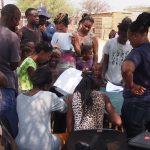The Orwetoveni community project aims to provide social, educational and recreational services to a deeply marginalized community, with an emphasis on activities for young people.
Orwetoveni is on the outskirts of the formerly black-only residential area of Otjiwarongo. It is an area of informal settlements. For the large part, people in this area live in extreme poverty and as a consequence have little to no opportunity to support basic needs such as food, shelter, health and education, let alone recreational facilities.
The idea for a project in Namibia was first brought to us in mid 2013 by the Rotary Club of Macquarie Park in Sydney. Established relationships already existed in the town of Otjiwarongo in Namibia, as did a keen enthusiasm to help a marginalised community; what was lacking was expertise in community development which is where indigo foundation could contribute, and support.
Prior to initial discussions with us, a proposal had been received by the Rotary Club of Macquarie Park from the Municipality of Otjiwarongo to build a Youth Centre in the informal settlement area where the most marginalised youth of the town live. The centre would be dedicated to providing social, educational and recreational services to the community, with an emphasis on youth activities and community welfare. The proposal subsequently underwent our rigorous assessment process, the outcome highlighting the need for further community consultation with a view to developing a robust plan to take the project forward and importantly, adhere to our guiding principles of community ownership, sustainability, equity and transparency.
In 2014 indigo foundation conducted a needs assessment and spent time building relationships in the community. During the visit, time was spent engaged in deep community consultation – with groups of varying age, gender and community standing. What we found largely confirmed our understanding of the situation – which was encouraging in terms of the big picture, but also vitally important in terms of ensuring sustainability.
We also learnt that within the area of the informal settlements, there are large numbers of teenage heads of households and of grandparents caring for orphans. Student pregnancies, substance abuse, illegal abortion and teenage suicide were reported to us as issues of great concern. Depression was also recognised as a common problem, albeit most likely not diagnosed or treated as such. The majority of residents in the informal settlements live without electricity or household water connection. Water is purchased by the council and distributed through water points on a pre-paid system. Physical and sexual abuse was reported as not uncommon and there are no provisions for support for gender based violence. Many children are undernourished and partially dehydrated and often have to walk long distances to school. Lack of access to food and water, and caring for family members who are unwell can mean children do not attend school, despite primary school education being free and compulsory in Namibia.
Abject poverty is commonplace and the psychosocial impacts of these family and community dynamics are devastating and typically go on to transcend generations. Regardless, one could feel a real sense of hope in the town and an enthusiasm to progress and identify new initiatives; despite their seemingly dire circumstances, the community still appeared to have motivation to improve their situation.

